Conflict zones: Intentions vs. outcome
Sreeram Chaulia, Vice Dean of the Jindal School of International Affairs, talks to Gateway House’s Samyukta Lakshman about his new book titled, "International Organisations and Civilian Protection".
Sreeram Chaulia, Vice Dean of the Jindal School of International Affairs, talks to Gateway House’s Samyukta Lakshman about his new book titled, "International Organisations and Civilian Protection".
 Courtesy: Sven-steffenarndt/WikimediaCommons
Courtesy: Sven-steffenarndt/WikimediaCommons
The U.S. Justice Department is slowly but surely clamping down on Pakistani terrorist activities, as is evident not only by the recent arrest of Kashmiri propogandist Ghulam Nabi Fai but also in open claim that the ISI Security Directorate "overseas militant groups".

India's declining sex-ratio could seriously impede its ability to achieve its full potential. Laadli honors innovative individuals who have donated their time and talent to changing this growing form of sex discrimination.
Robert O. Blake, U.S. Assistant Secretary of State for South and Central Asian Affairs, spoke to Manjeet Kripalani in an exclusive interview about the role of the Indian diaspora in the U.S. in fostering bilateral engagement between India and the U.S.
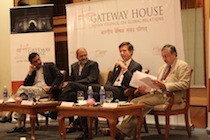 Courtesy: Gateway House
Courtesy: Gateway House
Gateway House: Indian Council on Global Relations, Mumbai, hosted a meeting on The Indian Diaspora: Converging Destinies. The role of the Indian Diaspora was amongst also on the agenda a few days before the event, at the India-US Strategic Dialogue held in Delhi from July 19 to 21.
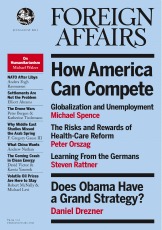 Courtesy: Foreign Affairs
Courtesy: Foreign Affairs
Henry Kissinger's new book argues that the United States should yield gracefully to China's rise; Aaron Friedberg's gives the opposite advice. By focusing on intentions instead of capabilities, both books overstate China's actual power.
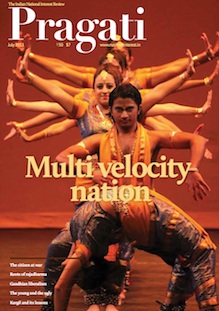 Courtesy: Pragati
Courtesy: Pragati
On May 1998, as India declared itself as a nuclear weapons state, it also committed its nuclear program to the No First Use of nuclear weapons policy. Consequently, the policy has been viewed as a democratic option, but what does this say about India?
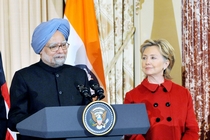 Courtesy: U.S.DepartmentofState/Flickr
Courtesy: U.S.DepartmentofState/Flickr
The upcoming strategic dialogue between India and the U.S. could prove significant: deepening people-to-people ties via the diaspora and collaboration on regional solutions could also enhance bilateral ties. Can this dialogue turn out to be a game changer in India-U.S. relations?

On July 13, three bombs went off in the busy streets of Mumbai. While the authorities try to apprehend suspects, the city remains enveloped in rain and a blanket of terror.
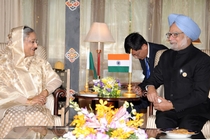 Courtesy: PMO
Courtesy: PMO
The constant engagement between India and Bangladesh in the recent past has garnered a more suitable political atmosphere for enhanced bilateral relations. Looking beyond political blunders and focusing on socio-economic cooperation is at the advantage of both nations.